In a Season of Change, One Constant Remains: Stanford Women’s Water Polo Is Again National Champions
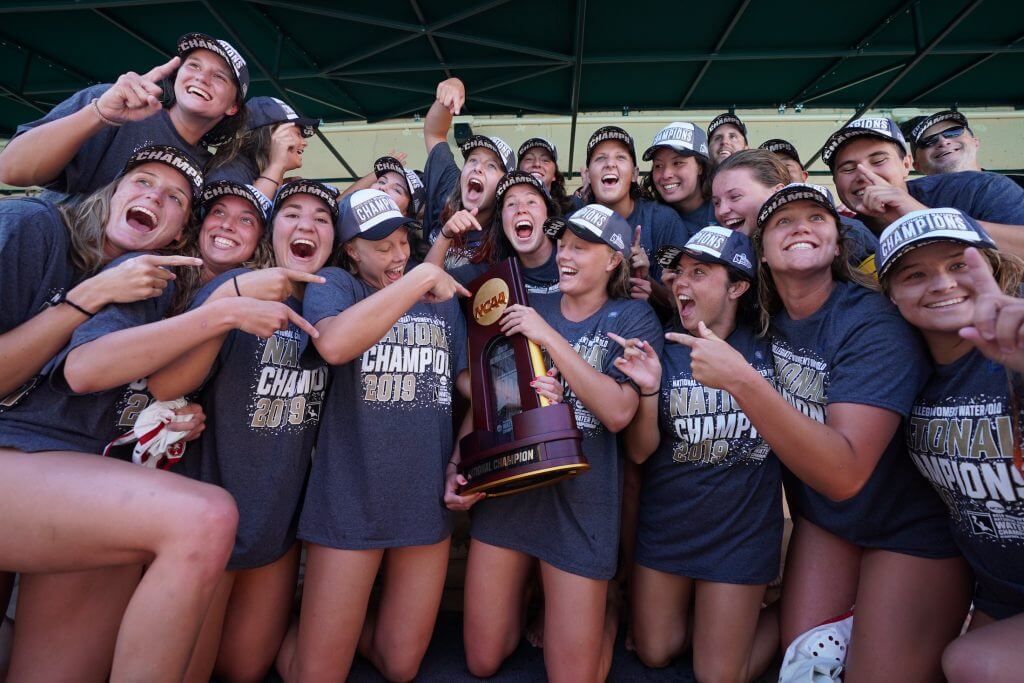
Editorial content for the 2019 NCAA DI Men's Swimming & Diving Championships coverage is sponsored by S&R Sport.
See full event coverage.
Follow S&R Sport on Instagram at @srsportaquatics
Editor’s Note: The 2019 NCAA Women’s Water Polo Tournament is happening this week—and Swimming World has you covered! Keep up with all the action online or look for #SwimmingWorld on Twitter and other social media platforms.
STANFORD, CA. On a gorgeous Sunday afternoon, Avery Aquatic Center presented the ideal backdrop for a brilliant display of women’s water polo. America’s two most accomplished women’s teams—containing some of the world’s best players—pushed and pulled and grappled in pursuit of our country’s biggest polo prize: an NCAA title.
 That the contest was between #1 USC and #2 Stanford may have been predictable, but it was also deserved. Opponents in last year’s national championship match—won 5-4 by USC—over the course of a long and grueling season both proved they were a cut above the competition, with both the Trojans and the Cardinal surviving upset bids the day before.
That the contest was between #1 USC and #2 Stanford may have been predictable, but it was also deserved. Opponents in last year’s national championship match—won 5-4 by USC—over the course of a long and grueling season both proved they were a cut above the competition, with both the Trojans and the Cardinal surviving upset bids the day before.
Neither team ever led by more than a goal, and they were tied at eight-all entering the fourth period. As the seconds tick, tick, ticked away, with both sides down essential players, it was Ryann Neushul, a wise-beyond-her-years freshman, who broke the deadlock, propelling the Cardinal to a 9-8 win and its seventh NCAA title.
“We were really challenged,” said Stanford Head Coach John Tanner after the match, “and they proved that every person and every moment was critical.”
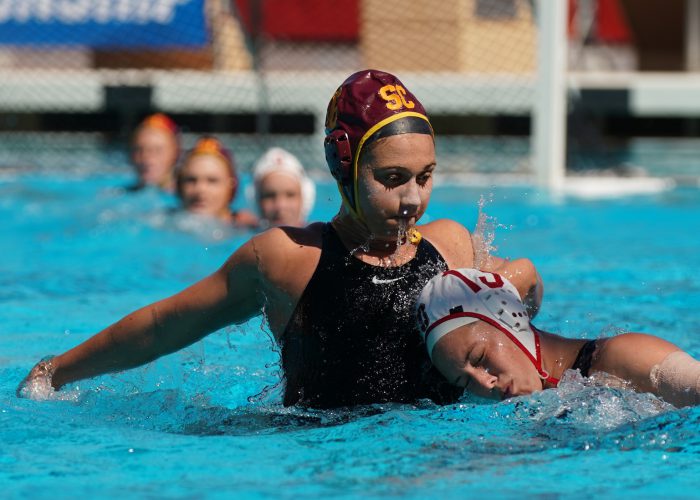
Let’s get physical – USC vs. Stanford style. Photo Courtesy: Catharyn Hayne
“We put on a show out there for sure,” USC Interim Head Coach Casey Moon added. “Two of the best teams in the country battling it out, going into the fourth quarter 8-8. You can’t ask for anything more exciting.”
It was a compelling match, and should be remembered as one of the more competitive finals in the two-decade history of the NCAA women’s tournament. Some will find it notable, however, for a different reason: it was the first-ever women’s championship not attended by Jovan Vavic, the Trojans’ disgraced ex-head coach who was implicated in the massive Varsity Blues admissions scandal.
When the smallish 5’7” Neushul beat USC goalie Amanda Longan with less than five minutes remaining in the match, it seemed somehow fitting; in a period of uncertainty due to Vavic’s abrupt firing less than two months ago, that the most important game this year would be decided by a relative newcomer to the collegiate scene.
During a jubilant Stanford press conference after the match, Neushul’s teammates commended her play in their season’s biggest moment.
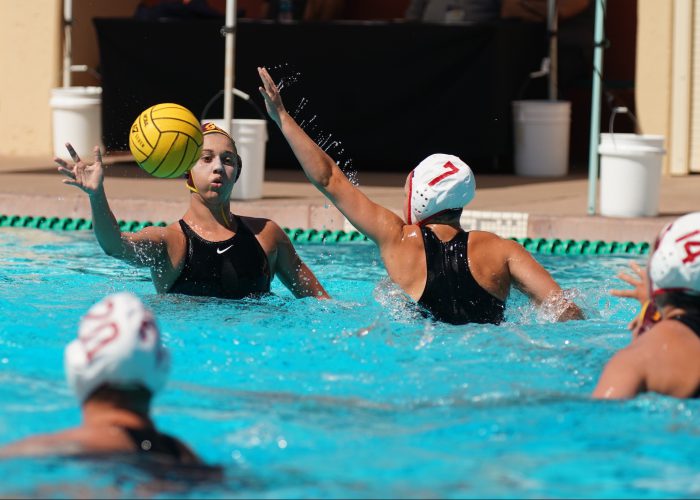
These Cardinals are fierce on defense. Photo Courtesy: Catharyn Hayne
“That’s just the way Ryann is,” said teammate Aria Fischer, who, after fouling out of the game, had a pool-side view of the winning shot. “It’s huge for a freshman to have that kind of poise—and to control a game like that.”
“Makenzie Fischer draws an entire team to her,” said Neushul, deflecting praise. “To be able to have [her] in the game, it opens you up to opportunities to demand that ball.”
Makenzie—Aria’s older sister—is the Cardinal’s all-world player whose 83 goals this season are second only to Ellen Estes’ total of 93 in a Stanford season. Named tournament MVP, she led Stanford with three goals, including a brilliant skip past Longan on a penalty shot; it tied the match at eight with a minute left in the third. Neushul and Aria Fischer each tallied two, with Kat Klass, in her final game at Stanford, and Hannah Schaub also scoring.
Defense wins championships—again
Essential to the win was the play of goalie Emalia Eichelberger. She turned away nine Trojan shots, with many stops of the spectacular variety, as she outplayed her USC counterpart Longan, last year’s national player of the year.
“It felt familiar. That’s a team that we have spent so much time in practice preparing for and multiple times over the season,” Eichelberger said, speaking of her team’s fourth meeting in 2019 with the defending NCAA champions. “We knew the ins and outs of what that team could possibly throw at us.”
Coach Tanner acknowledged that a key to Stanford’s defensive strategy was as basic as getting hands up in the faces of Trojan snipers.
“They have some good outside shooters, but they didn’t have much going because our blocks were terrific,” he said.
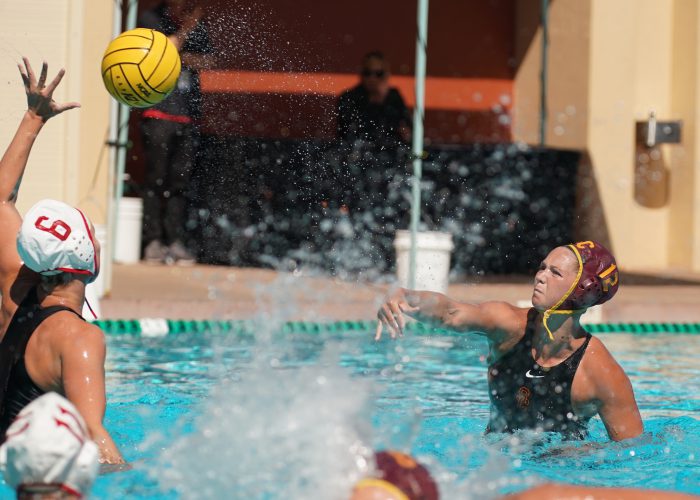
Kelsey MacIntosh can’t beat the block from Hannah Shabb. Photo Courtesy: Catharyn Hayne
Mireia Guiral, a freshman, had a game-high four goals for USC, all from inside three meters. Maud Megens tallied two, while Tilly Kearns and Kelsey McIntosh each contributed a goal apiece. Longan had nine saves, but was not her usually brilliant self—though that’s not why her team lost to the Cardinal. The reality may well be that this USC squad, built by Vavic to repeat as NCAA champions, was finally exhausted by the drama surrounding the long-time Southern Cal coach—who was let go a mere 11 games ago.
That, and Stanford had more in the tank when needed.
“What [the game] came down to was: toughness and which team could last longer,” Eichelberger said.
It’s noteworthy that the Trojans, who faced a torrent of negative news stories, were even in the national championship match. Given the depth of talent on the USC roster—five Trojans are members of their country’s national teams, headlined by Longan and Paige Hauschild for Team USA and Megens on Holland’s roster—it was tempting, if naive, to suggest that this team could somehow coach itself. But as it happened, the abrupt elevation of Moon, Vavic’s long-time assistant, turned out better than anyone might have reasonably expected.
And a freshman shall lead the Cardinal
That Stanford, which in the post-Maggie Steffens era has seemed to lack an emotionally demonstrative leader, might finding one in the charismatic Neushul, is not surprising. The Cardinal’s smallest player has perhaps the team’s most illustrious pedigree; her parents are fully invested in the sport as former players and coaches, while sisters Kiley and Jamie both won NCAA titles at Stanford and Olympic gold in 2016 as members of the U.S. Senior Women’s National Team.
When Aria Fischer—an Olympian like her sister, who is a prohibitive favorite to be picked as the nation’s top collegiate female player—drew her third exclusion with three minutes left in the third period, Neushul stepped up. She repeatedly moved into the middle of the pool, where the really big girls are, and demanded the ball. She got it, and when she scored, she set off jubilation in Stanford’s polo palace.
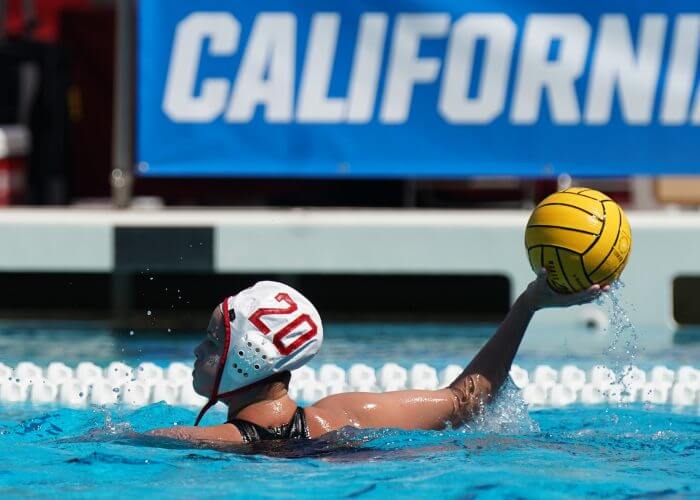
Stanford’s Ryann Neushul. Photo Courtesy: Catharyn Hayne
And on the next Cardinal possession, when Neushul blasted a backhand shot past Longan that was a second too late to beat the buzzer, a collective groan filled the house when the referee waived it off.
Even Neuchul’s opponents took notice of her spirited play.
“I commend her for [her] attitude,” said Trojan Kelsey McIntosh. ”Being a smaller, right-handed attacker, [I know] you have to play big in this high-level game.”
Down a score plenty of time remained for USC to mount a comeback; in fact, they had done just that with less time remaining and down a couple of goals two weeks ago at the Mountain Pacific Sports Federation final. That comeback ended with a win in overtime on a golden goal by Hauschild; this time she was glued to the Trojan bench, victimized by too many exclusions.
“[Hauschild is the focal point of our offense, defense,” said Coach Moon. “If somebody like that goes down, obviously how we play has got to change.
“Ultimately, it’s the next person up, and I have faith in all the girls.”
Their star’s absence placed additional stress on a Trojan offense that was also missing the similarly disqualified Alejandra Aznar, who the day before contributed two goals—on a team-high nine shots—in a semifinal win over Cal. It was left to Megens to step up. The Dutch native put three wicked shots on the Stanford cage in the match’s final minutes; the first one at 2:25 met Eichelberger arm with a resounding “thud”; the next smacked off the post at 44 seconds; the third was the game’s final attempt and skipped just wide.
“A player like Maud, if she’s on anybody’s team, she automatically elevates how your play,” Moon said, who later grew wistful on the late misses by the USC star: “If one barred in it’s a goal, and we could be here and the outcome could be entirely different.”
Almost inevitable
In the aftermath of a match as well-played as any this season, there was a sense of inevitability to the Cardinal championship win at home over their primary antagonists. Coach Tanner spoke about how planning for this moment began in late September, with a team-wide commitment to ensuring that they would find a way to be playing for the national championship at Avery on May 12.
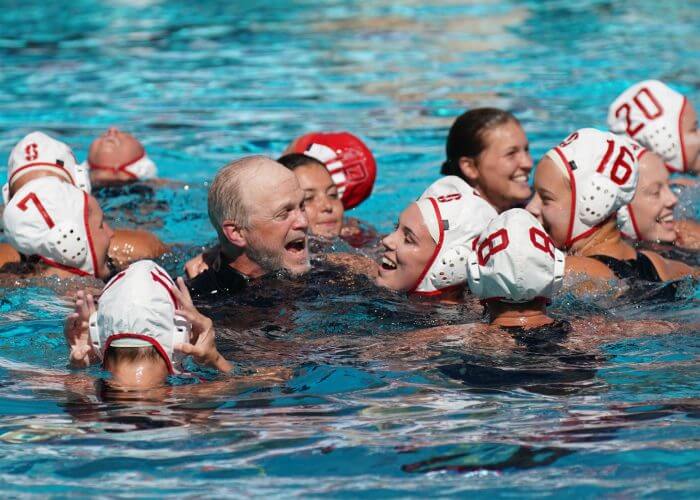
Why would anyone ever want to leave this celebration?! Photo Courtesy: Catharyn Hayne
Likely, of course, an identical commitment was made on the USC campus at roughly the same moment, when Vavic gathered his troops. And therein lies a now undeniable difference between the two programs. Tanner, who has been at Stanford 22 seasons, and has led the Cardinal to all their championships, is a fixture who will leave when he’s ready (and there’s no likelihood of this anytime soon), while Moon, who performed admirably under what had to be extremely challenging conditions—no one around the program mentions Vavic by name, as if their head coach for 25 years never existed—has no assurances that he’ll be on board next September when the chase for a title begins again.
No matter what Moon’s fate, or that of the USC program—and not discounting the progress made by Cal and UCLA, who both had strong showings in this tournament—it’s not unlikely that the Cardinal and the Trojan will be playing for a national title in 2020, perhaps again reversing roles.





